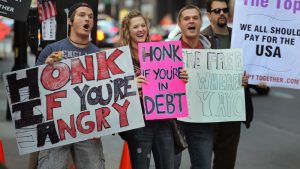
Posted on 23 March 2012 by Cami Graves
To me, “to Occupy”—with a capital “O”—means to inhabit or to take up space in a zone, either physical or ideological, where I was previously restricted. I embrace the reclamation of the word, because its reclamation represents the reclamation of all things formerly prohibited.
It conjures images of every freedom fighter who attempted to stand his or her ground when he or she was asked, told, or forced to leave. These freedom fighters were often people in exile. I, too, consider myself an exile. I was born an exile, a stranger in my own country: born a woman, born black, born to impoverished parents. I was born to be beaten down and ignored.
I was born to be a laborer and a commodity; people in my position have been so marginalized that we usually don’t even have value as spenders or as a corner of the capitalist market. We have no position and no clout. We learn the devastation of smallness early in life, and we internalize it so that it stays with us until the day we die. We are nothing. We are no one.
But this idea that has been spreading since last September, the idea that I, that anyone, can Occupy, can inhabit, can take up some space and stretch my limbs in a place where no one wanted me before—that’s an idea that inspires. It makes me believe that I can begin to really exist in a world where my existence was not accepted.
To Occupy is to become visible, and it’s synonymous with finally having a voice. The encampments that sprang up across the country and around the world last year were public announcements: we’re here. We’re not going away. You can no longer ignore us.
Struggling for voice is something I’ve been doing since I was a little girl. I don’t want to accept invisibility. It’s why I’m a writer. That’s why joining Occupy Oakland seemed like a no-brainer for me.
I live just down the street from 14th and Broadway, and though I was at first skeptical of the budding movement, I was impressed when I heard about the general assembly process. People were discussing things, they were engaging in direct democracy, they were listening to each other. What a beautiful prospect, a beautiful model for how society should be shaped.
Two weeks into the Oakland occupation, I swallowed my shyness and walked to Oscar Grant Plaza with a notebook and a pen. I didn’t know anyone there, but I started talking to people anyway: “Hi, I’m Cami. I’m a writer. It’s about the only thing I’m good at. Who do I talk to about writing for the movement?”
I had always felt like I was struggling alone, and alone, I was one little voice. With Occupy, I could join mine with many.
* * *
On the afternoon of February 26th, I met with three of the friends I had made at Occupy Oakland so we could walk to the general assembly together. We were nervous. The night before, we had written and released a controversial article attempting to bring questions to the rest of Occupy Oakland that seemed beyond our ability to handle ourselves. Since then, we had become the center of controversy, and for the past eighteen hours we had been receiving harassing and threatening tweets, phone calls, and emails. Our hope was that at the general assembly we’d have the chance to explain, to dialogue, and, somehow, to begin to smooth things over.
That’s not what happened.
Immediately, we could see that the atmosphere was hostile. Still we made ourselves available to the hundred or more people who were there if they wanted to talk to us. The problem is that few of them actually wanted to talk to us, and even fewer were willing to listen.
We did speak to a small group of people and answered questions during the forum. I felt that, at that time, our conversations were good and that we were being heard. I appreciated the people who listened, and I believe we tried our best to listen to them even though we were all in a heightened emotional state.
Questions and concerns were raised, and I began to recognize that there were issues with what we had published that we had not foreseen. I’m still pondering many of those issues.
I can only describe what happened after the forum as chaos. We got no chance to stand together to speak or answer questions calmly and reasonably. Instead, we waited on stack while person after person took the megaphone and accused us of being racist, irresponsible, divisive, and vindictive. People screamed at us, made rude gestures, and were physically intimidating (at least to me, a 5’1” woman).
My mind was racing the entire time, adrenaline pumping, head pounding, emotions (regret, sadness, fear, anger) popping off like an internal fireworks display. I wanted to go home, slow down, and just take some time to think, but I felt I had a responsibility to be there right then in that moment. I believed there was a way this could still be worked out.
I stood back as people hurled insults at Shake and Ben, who went up before me, and Noah circulated, trying to talk to people and being yelled at or ignored. It must have been hard for them, but if they braved it, I believed I could brave it too. We were all in this together.
But when I finally got my turn on stage, the first thing that happened was this: a white man pushed his way to the front of the crowd, looked me dead in the eye, and screamed, “Why does she get to speak?!”
I was floored. His voice, high-pitched, grating, passionate, almost hysterical, echoed over and over again in my mind. Everything else became loud, indistinguishable static. My own tongue felt like steel wool in my mouth.
“Why does she get to speak?!”
I can’t even wrap my head around that question, or why it, of everything else that was said that day, is what took the breath out of me. It wasn’t the anger behind it, because I have dealt with violent anger before. It was the very idea that I shouldn’t be allowed to speak, when all of my life I had been waiting for a chance to be heard and for people who would listen.
For months I had listened to others talk about their lives and beliefs, but I had never gone before the crowd to share mine. Now, even though it was an unfortunate occasion for it, I was in front of everyone and ready to share, but it seemed only a small minority wanted to give me the chance to defend myself or mend the situation.
I almost walked away right then, without saying anything. I stammered through some words I have to go back to the livestream to remember. An explanation. A defense. An appeal. “I’m willing to accept that we may have gone about this the wrong way,” I said. “I’m sorry if we offended people.” But it was too late, because even if my mouth was moving, it had already been decided that I had lost my right to speak.
* * *
During the following week, I watched as rumors and misinformation flew like carrier pigeons. People who I once thought were my friends ignored or, worse, harangued me; they were willing to believe things about me that they had never bothered to ask me about.
I told people they could email me, or I would even meet them in person. A few did ask me to explain what had happened, so we met for coffee, and I let them probe me for information. Shake, Ben, and Noah made the same efforts to reach out.
During that same week, the entire Occupy Oakland media committee came under attack. There were demands that they denounce and disown us, the “Gang of Four,” or there would be a proposal to the general assembly to disband the whole committee. As a result, Ben and I both announced that we were stepping away from the committee (and Occupy Oakland altogether). Shake was so busy he had only ever had time to be a satellite member, and Noah was never in the committee in the first place.
Despite our departure, the proposal to disband the committee went forward. I still don’t fully understand why. Why was it an emergency? Why was such haste required, without the possibility for at least a week or more of investigation and/or mediation? Why was such a drastic action the only option considered?
The media committee, on the other hand, asked us to come to mediation facilitated by an outside party, Dr. Samsarah, instead of throwing us out.* They chastised us, because most of them disagreed with the publication of the article and what was in it, but they also forgave us. They didn’t want us to leave, but to stay to help solve the problem we were now facing and to continue working as the team we had created together out of occupied air. Even though they were upset with us, they let us know that they still wanted us and trusted us.
For this—for moving slowly and with caution, for being kind to us, for loving us and forgiving us—my friends were vilified. They were called traitors and co-conspirators. In the same way that few had bothered to ask me what was going on, few bothered to ask them, though everyone seemed willing to listen to a lopsided story about them. I could see that it was painful and confusing for them to receive so much undeserved hate and anger, all the while being told not to take it personally.
When the proposal to disband the media committee came up at the general assembly the following week, its goal had already been accomplished. Most on the committee had already been scared away from Occupy Oakland because of all of the hurtful, untrue words that were circulating about them, though they never had anything to do with the article. No one wanted to face the unfriendly and unforgiving crowd from the week before.
* * *
But I have to go back to the beginning. The reality is this: Occupy Oakland makes up a very small microcosm of society, and though many of its people are kind and generous, they are still only people, after all.
People like me, people with varying backgrounds and biases, people who make mistakes. The authority that we confer upon ourselves is as much an imaginary and collective construct as the authority of the government, of any institution.
What I mean to say is that no one, not even Occupy Oakland, gets to tell me what to do. As I mentioned before, I’ve been struggling for voice since I was a little girl; if I can face a society that is as unabashedly cruel to black women now as it was a hundred years ago, well, I can also face progressive West Coast activists.
These people are not my enemies, and I won’t think of them as such, and I won’t let them treat me as such.
The Occupy movement is one that was especially designed for people like me. Occupy Oakland is widely considered to be the most diverse occupation in the country, perhaps in the world. Unfortunately, it’s still a mostly white political movement operating within and attempting to represent a city whose problems most greatly affect its black population.
These problems are, to put it simply, actually my problems.
In the wake of the publication of the article, a lot of people claimed that I and my co-signers had no place in a progressive movement. Maybe they thought we couldn’t understand the seriousness and the depth of the causes that Occupy is fighting for. One of their most oft-repeated arguments is that what we had done was racist, that we were racist.
I don’t believe and am not going to argue that all white people are incapable of comprehending the intricacies of racism or lack the aptitude needed to discuss it, but what does it mean when they assume that I am incapable, that I lack the aptitude?
On that Sunday after the article was published, a man from Afghanistan approached me to express that he felt he had been personally attacked. I won’t hesitate to admit that what we posted triggered deep and legitimate fears about Islamophobia and anti-Arab racism. We were not sensitive to the concerns of the Muslim and Arab communities, and that was a serious error.
As a person of color, I feel pain at causing others the exact kind of pain I have lived with my entire life. I got caught up in my own objective, prompted by fear of one man in particular, and that led me to be blind to my own egregious ignorance and insensitivity. Believe me, this is something that has kept me awake at night.
I won’t forget the man from Afghanistan. Because of him I’m regretful and ashamed, and to him I’m sorry. But, to be honest, the only effect of having an enormous mob of mostly white people scream that I’m racist was that I felt exploited by others’ confused or simplistic racial politics.
Obviously, people of color can be racist, even against themselves, but it takes a measure of privilege (the privilege of whiteness, or the privilege of the protection of a consenting crowd) to throw such an accusation without stopping to consider the repercussions for oneself or for the person one is accusing.
Consider that when people of color accuse someone of racism, we almost always come under the scrutiny of those who will claim we are “playing the race card,” a cliché from which, like the accusation of racism, there is no real defense . . . except to call the accuser racist—thus engaging a cycle that never gets at the root of the real problem, which requires addressing and analyzing the original offending behavior and why the response was what it was.
Also consider that when a person of color accuses another of racism, even in a non-hostile environment, we are hardly ever taken seriously, so we know it’s almost never the best course of action.
On numerous occasions at Occupy Oakland, I and others, especially other women of color, experienced frustrating moments of white patriarchy and extreme racial insensitivity. Yet I’ve never called anyone at Occupy Oakland racist. I’ve always known that the feeling resulting from most racially insensitive behavior is unintended, even though it hurts, and that leveling such an accusation could be more destructive than helpful. This is a common practice when it comes to dealing with white “allies.” People of color often bite our tongues because we understand that the intentions are good even where ignorance abounds.
Yet, there were times when we did complain about incidences of racism or insensitivity at Occupy Oakland, and we were often either dismissed or told to calm down; white “allies” suggested that we could all hold hands, sing kumbaya, and work it out. Of course, no white person wants to be exposed as a racist, so the natural recourse is to “work it out” by practicing some kind of racism rehab. But when I, a black woman, and two black men, along with our friend, faced a mob of white people who thought we had done something they deemed racist, the hand-holding, kumbaya-singing options were off the table. The irony was palpable.
What no one else knows is that for nights afterward, I cried my eyes out, not because I had been accused of racism and I felt victimized, but because if I had indeed hurt people, then I had hurt them in a way that I had been hurt repeatedly myself growing up black in a Midwestern ghetto. I hurt them in a way that I would never wish for anyone else to be hurt.
Whether the accusation was a political tool of others or it was heartfelt but uninformed, using it in what I believe was a flippant manner and then thinking that I would take it as lightly is the worst insult that anyone could possibly ever throw at me. How many white people calling me racist could understand the extremely painful nuances of being in such a situation, what a mindfuck that is?
* * *
What anyone who says I have no place in a progressive movement and who thinks they have the authority, alone or in concert with others, to tell me I can’t speak in a horizontal organization where everyone is supposed to have a voice doesn’t understand is that this isn’t my hobby. It’s my life. This is what I do.
Three of us who wrote that article are people of color–two of us veterans, one of us black and Native American, one of us from Oakland, one of us a woman. I’ve been beaten by an alcoholic, I’ve been molested, I’ve been fatherless, and I’ve been homeless. I will always fight to put an end to a society that makes such an upbringing commonplace. Understand: for me Occupy Oakland is not an end. It’s a means to an end.
Occupy is a platform. It’s here for people just like me to use. No, it’s for all of us, for anyone in the 99%. We all have a reason to be here, and none of us needs to be validated by others’ flawed reading of our experiences, perception, or commitment.
All four of the “Gang of Four” and many on the media committee have been committed to changing the world since long before Occupy Oakland. Anyone is welcome to condemn what they perceive to have been a mistake, but no one has the right to tell any of us to stop joining with other occupants of Oakland to work for justice.**
To believe that these causes aren’t our causes and we don’t have a right to use Occupy as a vehicle to fight for them is to underestimate the value and power of the individual, to marginalize and isolate, to perform the same acts of repression the government and 1% are guilty of performing, to subvert the very purpose and goal of Occupy. I can only assume that the internal dissonance this leads to must be so crippling that people are forced to reduce it to problems as simple as personality conflicts, clashing egos, and ill intentions.
If Occupy is a leaderless movement filled with leaders, each and every one of us has the responsibility to behave as we believe a leader should behave, to own up to our actions and to do our own investigating, to not just do what others tell us to do and believe what others tell us to believe. We must understand that others are leaders, as well, and we all deserve to be treated with dignity and respect, no matter how we may disagree.
If I failed to treat a comrade with dignity and respect, it’s because I sincerely believed it was entirely possible he was not a comrade but a minor limb of the government, here to infiltrate and tear us apart by attacking others, blocking work, making threats, and creating conflict and division, and, as I remember, Occupy Oakland doesn’t welcome or negotiate with the government.
If he is not working for the government, here is my heartfelt apology in writing: I’m sorry.
I wrote what I wrote, and while I’ve never been convinced I was totally right and understand that I may have acted without appropriate foresight, I was convinced enough to do what I did. Others’ condemnation will not stop me from defending myself or fighting for the causes that are close to me. I will continue to be a part of this movement. I will continue to do what I do best.
A friend and wise elder on the former media committee who is now in the collective said this, “I’ve heard a lot of people say Occupy Oakland radicalized them. Not me. I’ve always felt this way. I’ve always been radical. I’ve been waiting for this.”
It’s the same with me. I didn’t show up at Occupy Oakland back in October and learn things I had never been exposed to before. This was already in me. I was waiting for this, and I’m not the only one. We’ll be damned if we’re going to let others tell us to shut up or go away.
*None of these facilitated meetings were “secret”; they were announced on a Facebook page that all “members” of the media committee, despite their level of involvement or, as the case was, lack of involvement, had access to at the time.
**The proposal to disband the committee stipulates that the new “official” Occupy Oakland media committee’s job will be to produce press releases, hold press conferences, and respond to outside media requests. This stipulation in effect bans anyone who produces any other kind of media. Further, a proposal passed the week before restricts what can “officially” be published in the name of Occupy Oakland and promotes self-censorship—another means of alienating those whose goal it is to produce media for and document Occupy Oakland.









